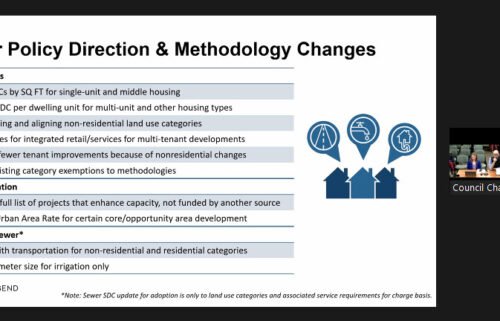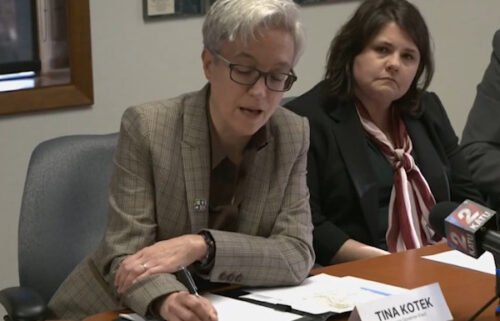Oregon Senate Democrats list several new state laws taking effect Jan. 1

SALEM, Ore. (KTVZ) – Several important new laws passed by the Oregon Legislature will take effect on New Year’s Day, Senate Democrats said Friday, releasing a list of the legislation taking effect in the new year.
These statutes will impact the day-to-day lives of Oregonians, covering everything from restitution for crime victims to workers’ compensation to voter registration, they said in a news release.
“These changes will make Oregon more safe, more fair, and more affordable,” said Senate Majority Leader Kate Lieber. “But the work isn’t done. We look forward to delivering more progress for the people of Oregon in 2023.”
A selection of the new laws going into effect on January 1, 2023 is available below.
FIXING PUBLIC SAFETY AND THE JUSTICE SYSTEM
House Bill 4075: Access to Restitution for Crime Victims
Access to restitution is important in the process for crime victims to move forward. HB 4075 streamlines the court process for obtaining an award of restitution and elevates payments to a higher obligation, so crime victims have priority in the distribution of payments made by the offender.
Senate Bill 1574: Ensure Proper Medical Forensic Care for Survivors of Sexual Assault Survivors of sexual assault seek care from Sexual Assault Nurse Examiners and Sexual Assault Examiners in hospitals across Oregon. It is often assumed that the evidence collected in hospital exams is included in the SAFE Kit, but sometimes it does not get included. SB 1574 ensures that the Medical Forensic Examination Forms are included in the SAFE Kit prior to transferring it to law enforcement.
STRENGTHENING OUR WORKFORCE AND THE ECONOMY
House Bill 4002: Farm Worker Overtime
Both state and federal law establish a maximum hour requirement of 40 hours per week and require employers pay one and one-half times the regular rate for all hours worked over 40 hours. However, agricultural workers were exempt from both the state and federal maximum hour requirement laws and therefore were not entitled to overtime pay. This inequity was accentuated by the intense manual labor, extreme heat and chemical exposure that farmworkers often face. HB 4002 remedies this inequity by phasing in overtime limits over several years, starting at 55 hours in 2023 and reaching 40 by 2027. Farmworkers will be entitled to one and half times pay for each hour beyond these limits. HB 4002 also allocates $55 million in tax credits and $10 million in grants or loans to help farm owners make this transition.
House Bill 4138: Injured Worker Parity Bill
Often, injured workers must rely on workers’ compensation benefits to replace their wages while unable to work. Once that worker reaches maximum improvement, the worker's compensation benefits end. At the same time, workers often find that their maximum improvement has been determined earlier than the doctor's final ruling, and they are faced with overpayments by the insurance company that paid out these benefits. HB 4138 provides worker protection by creating restrictions and extending time periods for backdated maximum improvements.
Senate Bill 1586: Protections from Inappropriate Nondisclosure Agreements
The Legislature passed the Workplace Fairness Act (WFA) in 2019. Under the WFA, a private employer must adopt a written policy outlining procedures and practices for reducing and preventing discrimination and sexual assault. The WFA also prohibits employers from entering into a nondisclosure agreement (NDA) as a condition of employment. It was brought to the attention of the Legislature that a loophole was being exploited that was effectively continuing the use of NDAs in inappropriate situations. SB 1586 closes this loophole. The law extends the prohibition regarding NDAs to cover former employees of private and public employers and clarifies that the prohibition covers current employees. The measure permits otherwise prohibited NDAs under specified circumstances and declares prohibited NDAs to be void and unenforceable.
Senate Bill 1513: Protecting Bakery Workers from Forced Overtime
Oregon law generally prohibits an employer from requiring an employee at a mill or factory to work more than 10 hours in a day or 55 hours in a workweek. If the employer processes perishable products, the employer may claim undue hardship. Oregon's predictive scheduling law also requires employers with at least 500 employees worldwide in the retail, hospitality, and food service industries to give employees a written work schedule at least two weeks in advance, however, it exempted manufacturing. SB 1513 rectifies loopholes that some bakeries were exploiting to force workers to work overtime without notice. The bill prohibits bakery and tortilla manufacturers from taking adverse employment action against an employee who refuses to work a mandatory overtime shift without at least five days’ notice.
House Bill 4113: Worker Compensation for Firefighters with Ovarian Cancer
Oregon workers’ compensation laws establish that certain cancers, including oral and male reproductive cancers, are presumed to be a compensable occupational disease for non volunteer firefighters who have been on the job for at least five years. HB 4113 adds bladder and female reproductive cancers to this list. An employer can rebut the presumption by providing clear and convincing medical evidence that cancer was not caused or materially contributed to by the firefighter’s employment.
MAKING HEALTH CARE AFFORDABLE AND ACCESSIBLE
Senate Bill 1555: Universal Home Visiting Reimbursement
Senate Bill 526 established the Universal Home Visiting program in Oregon. Home Visit programs have shown positive impacts on reducing incidences of child abuse and neglect, improvement in birth outcomes, improvement in school readiness, and increased high school graduation rates for others who participate. SB 1555 clarifies the Oregon Health Authorities responsibility to support local newborn home visiting services and provide reimbursement for these services.
Senate Bill 1538: Dental care for the Compact of Free Association Communities
SB 1538 Establishes a dental program through the Oregon Health Authority for low-income citizens of Pacific Island countries in the COFA community who reside in Oregon.
SUPPORTING OREGON TEACHERS AND STUDENTS
House Bill 4124: Survey and Best Practices for School Assessments
Oregon schools administer a wide range of standardized tests to identify student progress, barriers, and improvements needed. While standardized tests are helpful, we must understand which are the right types of assessments and when is the best time to administer them. House Bill 4124 creates a workgroup to administer a survey to gather information about assessments mandated by the state, federal government, and school districts. This survey will capture who provides these tests, how much they cost, the purpose, and what data this information provides back to the schools. In partnership with the Department of Education, this workgroup will develop recommendations and best practices to ensure mandated academic assessments are used effectively.
House Bill 4031: Establishing Diversity Goals for Oregon Schools
To promote equality and representation in our schools, House Bill 4031 creates a goal to have the percentage of diverse employees employed by the Department of Education match the percentage of diverse students in our public schools.
SAFEGUARDING DEMOCRACY
House Bill 4114: Economic Disclosure Filing for School Board Members
Most Oregon elected officials are required to annually disclose their economic affiliations to the Oregon Government Ethics Commission on a form called the ‘Statement of Economic Interest’ or SEI. Before the passage of HB 4114, local school board members across the state were not required to submit the form. HB 4114 changes the statute to require school board members to annually complete and submit the SEI to the Ethics Commission.
House Bill 4133: Online Voter Registration
Since 2010, Oregon has made it easy for citizens with a driver's license to register to vote online. Before the passage of HB 4133, eligible voters who did not possess a driver's license did not have access to this method of online registration. This bill makes it easier for Oregonians who do not have a driver's license to register to vote online.



